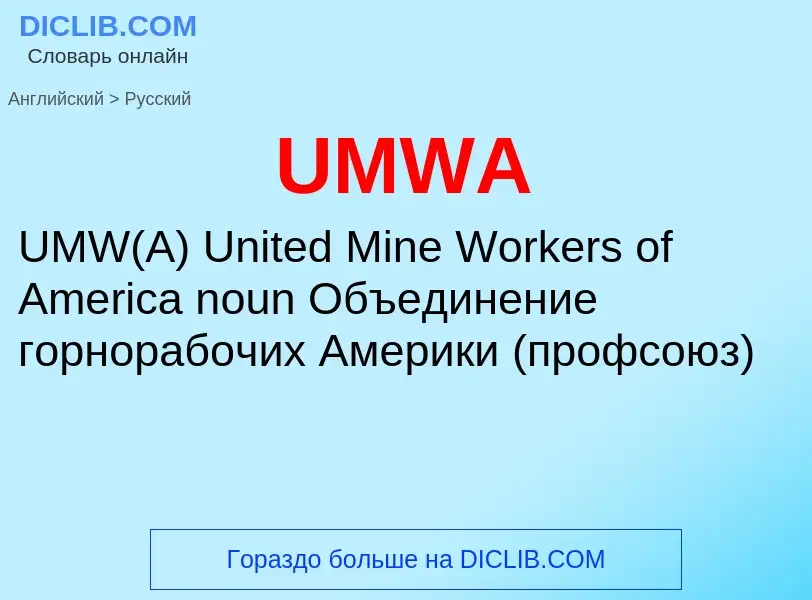Übersetzung und Analyse von Wörtern durch künstliche Intelligenz ChatGPT
Auf dieser Seite erhalten Sie eine detaillierte Analyse eines Wortes oder einer Phrase mithilfe der besten heute verfügbaren Technologie der künstlichen Intelligenz:
- wie das Wort verwendet wird
- Häufigkeit der Nutzung
- es wird häufiger in mündlicher oder schriftlicher Rede verwendet
- Wortübersetzungsoptionen
- Anwendungsbeispiele (mehrere Phrasen mit Übersetzung)
- Etymologie
N U M National Union of Mine workers - Übersetzung nach Englisch
существительное
общая лексика
Объединение горнорабочих Америки (профсоюз)
синоним
[,ju:njənəv,pəust,ɔfɪs'wə:kəz]
общая лексика
Профсоюз почтовых работников (входит в состав Британского конгресса тред-юнионов [Trades Union Congress])
Definition
Wikipedia
The United Mine Workers of America (UMW or UMWA) is a North American labor union best known for representing coal miners. Today, the Union also represents health care workers, truck drivers, manufacturing workers and public employees in the United States and Canada. Although its main focus has always been on workers and their rights, the UMW of today also advocates for better roads, schools, and universal health care. By 2014, coal mining had largely shifted to open pit mines in Wyoming, and there were only 60,000 active coal miners. The UMW was left with 35,000 members, of whom 20,000 were coal miners, chiefly in underground mines in Kentucky and West Virginia. However it was responsible for pensions and medical benefits for 40,000 retired miners, and for 50,000 spouses and dependents.
The UMW was founded in Columbus, Ohio, on January 25, 1890, with the merger of two old labor groups, the Knights of Labor Trade Assembly No. 135 and the National Progressive Miners Union. Adopting the model of the union was initially established as a three-pronged labor tool: to develop mine safety; to improve mine workers' independence from the mine owners and the company store; and to provide miners with collective bargaining power.
After passage of the National Recovery Act in 1933 during the Great Depression, organizers spread throughout the United States to organize all coal miners into labor unions. Under the powerful leadership of John L. Lewis, the UMW broke with the American Federation of Labor and set up its own federation, the CIO (Congress of Industrial Organizations). Its organizers fanned out to organize major industries, including automobiles, steel, electrical equipment, rubber, paint and chemical, and fought a series of battles with the AFL. The UMW grew to 800,000 members and was an element in the New Deal Coalition supporting Democratic President Franklin D. Roosevelt. Lewis broke with Roosevelt in 1940 and left the CIO, leaving the UMW increasingly isolated in the labor movement. During World War II the UMW was involved in a series of major strikes and threatened walkouts that angered public opinion and energized pro-business opponents. After the war, the UMW concentrated on gaining large increases in wages, medical services and retirement benefits for its shrinking membership, which was contending with changes in technology and declining mines in the East.


![United Mine Workers meeting with Congressman [[Tom O'Halleran]] in 2020. United Mine Workers meeting with Congressman [[Tom O'Halleran]] in 2020.](https://commons.wikimedia.org/wiki/Special:FilePath/Tom O'Halleran with United Mine Workers.jpg?width=200)
